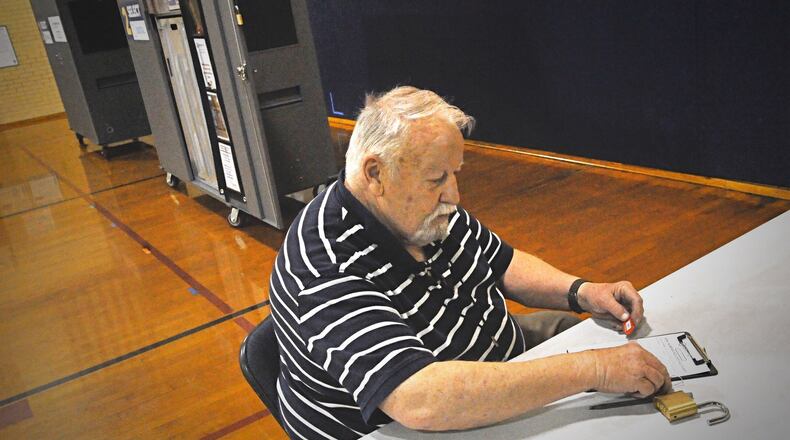“We just have to make sure we keep it in front of the voters again and capture anybody that for some reason over the last nine months hasn’t heard our plan,” said Chris Piper, Troy Schools superintendent. “We’re kind of in unknown territory here for campaigns.
MORE: Coronavirus: More than 200 people seek COVID-19 test as Dayton’s first drive-up testing begins
If the levy would have passed Tuesday, the Troy district would have wasted little time on getting to plans to replace seven aging schools with four new ones, Piper said.
“We had the process moving forward. It was contingent on a yes vote to start working with construction management firms to get a head start on the project,” he said. “That obviously will be pushed back.”
Along with Troy in a waiting game, Valley View School District is looking to replace three of its four buildings if a bond issue on the ballot passes.
“That starts the first domino for that whole process to begin,” said Valley View Superintendent Ben Richards. “Now we have to wait to find out if that’s going to be proceeding.”
Election uncertainty also puts the Valley View district in limbo planning for reductions should its issue fail. Richards presented a long list of cuts including elementary school music, art and gym classes, elimination of all district clubs, junior high sports and school dances. High school pay-to-play would go up $400 a sport and special education and secretarial staff would be reduced.
“We were looking for some clarity on the direction of our district at the conclusion of today, but obviously that won’t be happening at this time,” Richards said Tuesday.
MORE: Valley View schools spell out cuts if voters reject March levy
Montgomery County Auditor Karl Keith said the extension should have little bearing on mechanics of implementing a new levy. Whether passed this week or in June, the revenue would begin going to a city or school district at the same time — starting in January 2021.
“That gives us plenty of time,” said Keith, who noted outside of presidential election year like this, primaries are typically held in May or June.
County auditor’s offices and the Ohio Department of Taxation figure how much voters’ decisions cost a property owner.
West Carrollton Fire and EMS, Jackson Township Police and Oakwood’s Wright Memorial Library are also seeking to increase revenues with levies on the primary ballot.
PHOTOS: Polls closed over coronavirus health hazard
Keith said the impact of a delay is more likely to be felt by candidates who built months-long campaigns targeting a March 17 election.
“Now they’re going to have to refocus, redesign their campaign strategies, and basically start over and look to a second date,” he said. “It’s going to be difficult for any of them, fundraising and getting volunteers and doing the types of things that campaigns usually do. Under the current circumstances is going to be very difficult.”
During a chain of events that left some voters confused Tuesday morning, Amy Acton, Ohio’s Department of Public Health director got in the final word Monday, ordering polls closed after a Franklin County judge had ruled to keep them open.
Ohio’s Gov. Mike DeWine said the difficult decision will allow everyone’s vote — eventually — to count, while putting the fewest number Ohioans at risk of contracting COVID-19.
Had the election proceeded it “would force poll workers and voters to place themselves at a unacceptable health risk of contracting coronavirus,” DeWine said.
As of Tuesday afternoon, 67 coronavirus cases had been confirmed in 16 Ohio counties, according to the Ohio Department of Health. Six of the cases were in nearby Butler County and one in Darke County. No cases had been identified in Clark, Greene, Miami, Montgomery or Warren counties as of Tuesday afternoon.
CORONAVIRUS: Complete Coverage
Arizona, Florida and Illinois went ahead with primaries Tuesday. But Ohio’s election suspension puts in limbo Ohio’s 136 Democratic delegates to the Democratic National Convention. But former Vice President Joe Biden was poised in the other three states to extend a delegate count lead over Vermont Sen. Bernie Sanders in the primary.
After Monday night’s extraordinary order by Acton, Secretary of State Frank LaRose issued a directive to the state’s elections boards that suspended in-person voting and set the new date to June 2.
No new voter registrations will be accepted for the primary, but the directive allows people already registered but who haven’t voted to obtain absentee ballots through May 26 from their county’s board of elections. Registered voters who become hospitalized right up to June 2 will also be able to cast ballots.
The directive also prohibits election boards from tabulating and reporting any results until the close of polls on June 2.
CHECKLIST: Here’s what experts say you can do to prepare for an outbreak
The votes already cast in Ohio are “under double lock and key,” said Montgomery County Board of Elections Director Jan Kelly.
“We are moving forward with what was instructed per Secretary of State LaRose’s directive, which has the full effect and force of law for us to follow,” Kelly said.
Officials posted notifications outside each of Montgomery County’s 144 polling locations, Kelly said. Between 35 and 40 voters didn’t get the word and showed up to vote early Tuesday, she said.
On Tuesday, Montgomery County residents who completed absentee ballots were still able to drop them at a drive-through location outside the Montgomery County Administration Building.
Elections officials will begin working immediately to arrange to use the polling locations again and line up elections workers again, which could be a more difficult task, Kelly said.
About the Author

